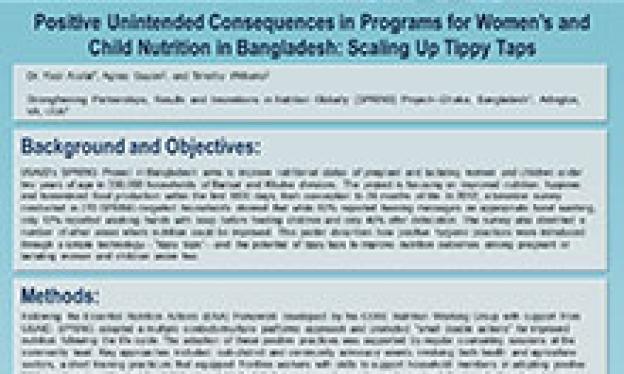Authors: Arafat, Y; Guyon A; Williams T
Background and objectives: USAID’s SPRING Project in Bangladesh aims to improve nutritional status of pregnant and lactating women and children under two years of age in 350,000 households of Barisal and Khulna divisions. The project is focusing on improved nutrition, hygiene, and homestead food production within the first 1000 days, from conception to 24 months of life. In 2012, a baseline survey conducted in 770 SPRING-targeted households showed that while 60% reported hearing messages on appropriate hand washing, only 12% reported washing hands with soap before feeding children and only 40% after defecation. The survey also identified a number of other areas where nutrition could be improved. This poster describes how positive hygiene practices were introduced through a simple technology—“tippy taps”—and the potential of tippy taps to improve nutrition outcomes among pregnant or lactating women and children under two.
Methods: Following the Essential Nutrition Actions (ENA) framework developed by the CORE Nutrition Working Group with support from USAID, SPRING adopted a multiple contacts/multiple platforms approach and promoted "small doable actions" for improved nutrition following the life cycle. The adoption of these positive practices was supported by regular counseling sessions at the community level. Key approaches included: sub-district and community advocacy events involving both health and agriculture sectors, a short training practicum that equipped frontline workers with skills to support household members in adopting positive ENA practices, and Farmer Field Schools established to help communities enhance homestead food production (vegetables, poultry, and fish) and encourage the adoption of positive nutrition and hygiene practices.
Because of the new evidence of better hygiene practices will improve nutrition outcomes, the establishment of a tippy tap near the toilet and the cooking area was promoted as a means to improve hygiene through the adoption of effective hand washing practices.
Regular follow-up visits and supportive supervision were carried out at household level to support family members in establishing and using the tippy taps.
Results: Since October 2011:
- 15,504 representatives of government ministries and nongovernmental organizations were reached through 400 advocacy events.
- 6,271 frontline workers were trained in installing and using tippy taps (5,143 health workers, 839 agriculture workers and 289 partner community workers). Approximately 65% of those trained have reported including nutrition and hygiene messages, including information on tippy taps, in routine sessions.
- Through 1,301 Farmer Field Schools, 29,217 resource-poor households were reached and encouraged to install tippy taps next to their kitchens and toilets. To date, 17,248 households (59% of Farmer Field School participants) have installed tippy taps in appropriate locations in the household.
Conclusions: Current knowledge suggests that including Essential Hygiene Actions in nutrition interventions has potential to contribute to better nutrition outcomes. The integration of the use of tippy taps into homestead food production, nutrition, and hygiene programs may be a promising strategy to improve hand washing practices. Measuring the actual impact of tippy tap installation on hand washing practices is a question for future research.
